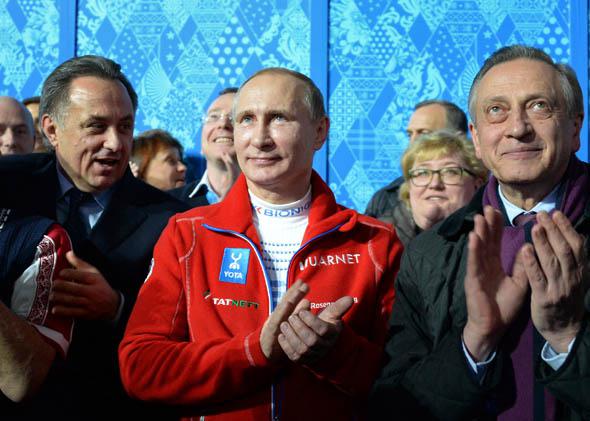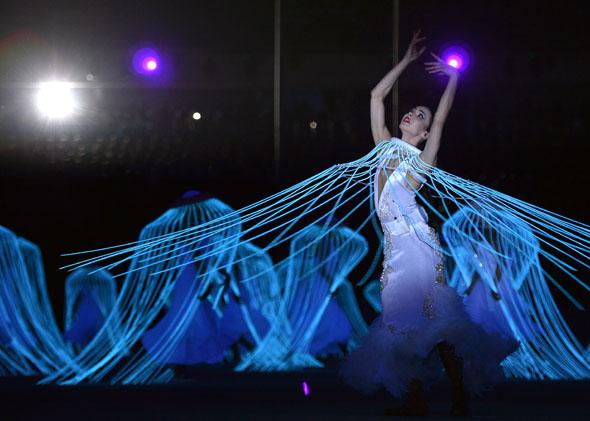In 1826, Alexander Pushkin wrote to a friend: “I certainly despise my motherland from head to toe, yet still I am vexed when a foreigner shares that sentiment.” So far, the Sochi Olympics coverage (as well as the burgeoning genre of coverage coverage) puts one in mind of this quotation almost daily.
For all its protestations of self-sufficiency, Russia is utterly obsessed with how it’s seen in the West. In fact, these two notions are linked in a charmingly adolescent way: The louder the exceptionalist talk about the country’s “special path,” the stronger the curiosity to check how it’s being received. Since the mid-aughts, the Kremlin has been quietly wasting millions on PR firms like Ketchum in order to improve its image abroad; a government-funded news portal exists solely to translate foreign articles about Russia into Russian; and any modicum of success a Russian actor, artist, or writer enjoys in the West is immediately blown out of proportion back home. I myself am a happy beneficiary of this fallacy, having moved to Moscow after my modest-selling American debut novel became a freak success in Russian translation.
The anti-Putin camp shares the same obsession, but with a self-flagellating twist. The most common question I get asked in Moscow’s liberal circles is the incredulous “Why would anyone move here from New York?”—which is more of a statement than a question. (In response, I use a page from the Fox News playbook and counter with “Why do you hate Russia?”) One of the enduring features at the hip, somewhat oppositional Afisha magazine is “In the Eyes of a Foreigner,” wherein an expat like me is yanked off the street to profess (mostly) horror at Russian life; a more advanced version of the same feature involves giving, say, an American graphic designer a batch of Russian book covers to laugh at. The animating idea—aren’t we the worst?—is a kind of exceptionalism, too, and thus comforting. For both the Kremlin and its critics, then, the Sochi Olympics are the biggest “In the Eyes of a Foreigner” installment ever. The former craved a global triumph, of course. The latter were put in a far weirder quandary.
Within the Russian opposition, there does exist a zero-sum school of thought, voiced by a few public figures, that the Olympics are Vladimir Putin’s project first and foremost, and thus the worse Russia looks, the better news it is for the cause. (True, Putin doesn’t exactly make it easy to disassociate the games from himself: Three of the Olympic flag-bearers at the opening ceremony, for example, were his surrogates in the 2012 election. Imagine being a Democrat and trying to root for the U.S. in Salt Lake City as Chuck Norris passed the torch to Ted Nugent.) Some went so far as to make a call for an “alternative, noncommercial, people-financed” Olympics, which was mercifully laughed off Facebook. Still, the idea of publicly cheering against Russia repulses even Putin’s harshest critics (even if the key word here is “publicly”). As a result, some are caught in a never-ending backlash to whatever’s been said last.
Things began at a low point. Well before the first athletes arrived in Sochi, the tales of widespread corruption had considerably soured the public on the games. In an early-February poll, 47 percent of respondents assumed that “a significant part of the Olympic funds” had been embezzled; 62 percent were sure that the culprits would avoid any punishment; and an astonishing 38 percent figured that graft opportunities provided by the games were the main reason for holding them here in the first place. So, when those first double-toilet pictures began popping up and the first foreign reporters began tweeting their tales of hotel woe, the narrative of embarrassment and shoddiness felt almost satisfying. It hinted at the possibility that things were so bad that someone would finally get punished; that Putin’s $50 billion prom dress was coming apart at the seams. At first the chattering classes on Facebook (in Russia, where the majority uses its local clone VKontakte, Facebook has a city-elite air) enthusiastically shared every picture. Shaun Walker of the Guardian, who got to Sochi a few days before the ceremony, has supplied many of the Sochi-is-broken memes by hilariously complaining about his accommodations. Afisha immediately hired him for a daily dispatch.

Photo by Yuri Kadobnov/AFP/Getty Images
Within days, however, the tone changed. The consensus, even in the most self-abashed circles, was that the West had glommed on to the #sochiproblems meme a little too enthusiastically. The backlash to the backlash has made patriots of critics. Commenters began attacking Walker’s column for “anti-Russian bias” when his posts were neutral, or even glowing. International coverage generally didn’t sit well. “Granted, I’m a fine practitioner of mocking Russian ridiculousness,” wrote Julia Ioffe in the New Republic, “[but] it does seem like the Western press is on the hunt for evidence of how inept and hilarious the Russians are.” Here is that Pushkin quote again, in slightly different words.
At that point something miraculous happened: The games’ opening ceremony, overseen by Channel One honcho Konstantin Ernst, won over just about everyone. The ceremony’s sweep was certainly enough to please Putin, but the vision of Russia it celebrated—highbrow, logocentric, unmistakably European—oddly dovetailed with how the opposition sees Russia too. Gone, for a moment, were the last year and a half of “tightening screws,” the courting and empowerment of the most backward and reactionary elements of the national psyche. Last year a group of “Cossacks” tried to hound the Nabokov museum out of St. Petersburg for promoting “filth”; in Sochi, Nabokov was the N in the video recitation of the Russian alphabet that opened the ceremony. Whether it meant to or not, the ceremony’s pageantry alleviated Russia’s biggest ache by conjuring up a country and a culture that were, to use a popular word that day, unembarrassing.
Then, of course, the actual competitions began, and with them the inevitable medal count and Russia’s so-far-so-so results; the cycle of pride, paranoia, and schadenfreude began anew. One of the most telling pictures making the Facebook rounds today is of an alternative count, which pits “official” medals won by Russia (represented by its tricolor flag) against the medals won by various émigrés from Russia (represented by a pig on a tractor, a Web meme too complicated to explain here). So far, the émigrés are winning. The point of this exercise is perfectly ambivalent, and encompasses both sides of the liberals’ quandary. There is masochism at work here, sure—but patriotism, too. It illustrates a desire for Russia to be the kind of country that people won’t want to leave. If the Sochi Olympics show us anything, it’s not how cocky, belligerent, or inept today’s Russia is; it’s how desperately it wants to be liked by the world so it can like itself again.
